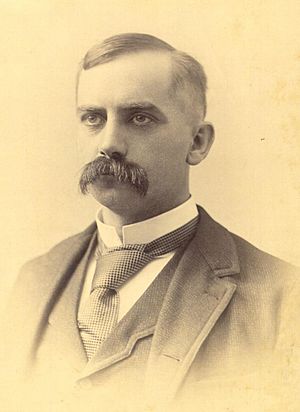Horace Speed facts for kids
Quick facts for kids
Horace Speed
|
|
|---|---|
 |
|
| Born | January 25, 1852 Nelson County, Kentucky
|
| Died | December 28, 1924 (aged 72) Tulsa, Oklahoma
|
| Occupation | Attorney |
| Known for | First United States District Attorney for Oklahoma Territory |
Horace Speed (born January 25, 1852 – died December 28, 1924) was an important pioneer in Oklahoma. He was the very first United States District Attorney for Oklahoma Territory. This means he was the main government lawyer for the area.
Speed was born in Nelson County, Kentucky. He became a well-known attorney in Indiana. He even worked with Benjamin Harrison, who later became President of the United States. In 1889, Speed moved to Winfield, Kansas. After the famous Run of '89, he started his own law practice in Guthrie, Oklahoma Territory.
Because of his work with the Cherokee Commission, President Benjamin Harrison chose him for a big job. Speed became the United States Attorney for the territory from 1890 to 1894. He served again briefly in 1900. He was the last US Attorney for the territory before it was divided into smaller areas. As the US Attorney, he worked to stop outlaws and dealt with many land fraud cases. These cases were a big problem during the land openings.
In 1901, President Theodore Roosevelt asked Speed to become the governor of the territory. Speed said no to the offer. Later, Thompson Benton Ferguson became governor instead. After Oklahoma became a state, Speed moved to Tulsa. He opened a new law firm there. He passed away in Tulsa in 1924.
Early Life and Education
Horace Speed was born on January 25, 1852. His parents were Thomas and Margaret (Hawkins) Speed. He grew up in Nelson County, Kentucky. He went to public school until he was 14 years old. Then, he left school to help on his father's farm.
When he was 17, Speed got a job as a clerk. He worked for General John Parker Hawkins in Washington, D. C. He stayed in this job for eight years. During this time, he also studied law. He passed his exams and became a lawyer. In 1877, he joined a law firm in Indianapolis, Indiana. The main partner was General Benjamin Harrison. After one year, Speed decided to start his own law practice.
Speed worked as a lawyer in Indiana until 1889. That year, he moved to Winfield, Kansas. He did not stay there long. He wanted to take part in the first Oklahoma land run. On April 22, 1889, the day of the run, he opened his law office. It was in Guthrie, Indian Territory. He also worked as a secretary for the Jerome Commission. This group helped open the Cherokee Outlet for settlement. They worked with the Cherokee Nation.
Serving as District Attorney
After the Oklahoma Territory was officially created in 1890, Horace Speed received an important appointment. He became the first U. S. District Attorney for the Territory. One of his main goals was to fix problems at the Land Office. This office had many issues with dishonest people. Speed worked hard to show that he was fair and honest. He helped the public trust the Land Office again.
Speed also handled the "Cherokee Outlet cases." In these cases, some cattle owners wanted to stop the government. They did not want their cattle removed from the Cherokee Outlet. Speed argued for the government. He won the case, proving the government had the right to remove the cattle.
Speed also investigated a very serious crime. He found the people responsible for a terrible act. His work led to the arrest and conviction of many men. This was the first time such criminals were brought to justice in the Southwest. Speed made sure that justice was served.
In 1905, President Theodore Roosevelt offered Speed a new role. He wanted Speed to become the sixth Governor of Oklahoma Territory. But Speed wanted to go back to his private law work. So, he turned down the offer.
Later Life and Family
Horace Speed continued to live in Guthrie. He kept his own law office there until 1913. Then, he moved to Tulsa, Oklahoma. In Tulsa, he became a partner in a law firm called Speed and Righter. He worked with Fred R. Righter. He lived and practiced law in Tulsa until he passed away. He died at his home on December 28, 1924. His funeral was held at the First Presbyterian Church in Tulsa.
Speed was married twice. His first wife was Jessie St. John Adams. They married on November 21, 1892. Jessie passed away on May 24, 1894. On August 2, 1895, he married Matilda McAlester. She survived him. Horace Speed also had one son, Colonel Horace Speed, Jr. His son was in the U. S. Army. Speed was also survived by his sister, Miss Louise J. Speed.
 | Madam C. J. Walker |
 | Janet Emerson Bashen |
 | Annie Turnbo Malone |
 | Maggie L. Walker |

